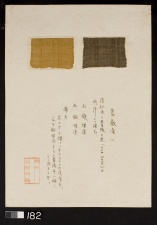Difference between revisions of "Awai beniiro no bara (Tea rose) - right (182 R)"
Jump to navigation
Jump to search
(username removed) |
m (MDerrick moved page Awai beniiro no bara - right (182 R) to Awai beniiro no bara (Tea rose) - right (182 R) without leaving a redirect) |
||
| (2 intermediate revisions by one other user not shown) | |||
| Line 5: | Line 5: | ||
| 182 | | 182 | ||
|- | |- | ||
| − | ! scope="row"| | + | ! scope="row"|Uemura number / title |
| − | | | + | | ; "Haze-some 25" |
|- | |- | ||
! scope="row"|Folder location | ! scope="row"|Folder location | ||
| Line 44: | Line 44: | ||
| - | | - | ||
|- | |- | ||
| − | ! scope="row"| | + | ! scope="row"|Uemura's notes |
| When rubbing fresh flower petals of the rose on a fabric, the resultant color was pale purple. And by mordanting this with copper, the color became yellow brown. The dye compound did not have good affinity with the fiber. | | When rubbing fresh flower petals of the rose on a fabric, the resultant color was pale purple. And by mordanting this with copper, the color became yellow brown. The dye compound did not have good affinity with the fiber. | ||
|- | |- | ||
| − | ! scope="row"| | + | ! scope="row"|Uemura's date |
| Kyoto | | Kyoto | ||
|} | |} | ||
| − | [[Category: | + | [[Category:Uemura dye archive]] |
Latest revision as of 12:23, 22 June 2020
| Museum number | 182 |
|---|---|
| Uemura number / title | ; "Haze-some 25" |
| Folder location | 3rd shelf |
| Sample location | right (182 R) |
| Fiber type | silk |
| Color | black |
| Dyestuff (Japanese common name) | 淡紅色の薔薇 : Awai beniiro no bara |
| Dye (English common name) | Tea rose /light pink rose |
| Dyestuff (botanical name) | Rosa x centifolia L. (?) |
| Plant part | flower /fresh (?) |
| Dyestuff extraction | boiled in water |
| Auxiliary agent in dye bath | - |
| Mordant | iron |
| Other auxiliary agent | - |
| Uemura's notes | When rubbing fresh flower petals of the rose on a fabric, the resultant color was pale purple. And by mordanting this with copper, the color became yellow brown. The dye compound did not have good affinity with the fiber. |
| Uemura's date | Kyoto |
